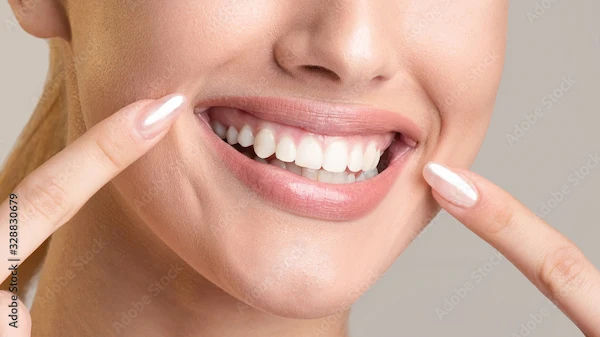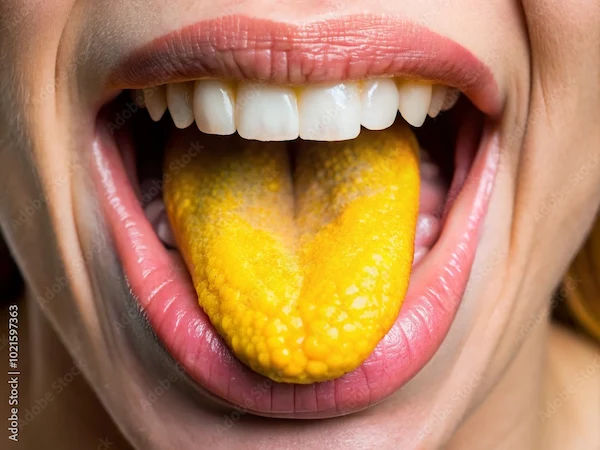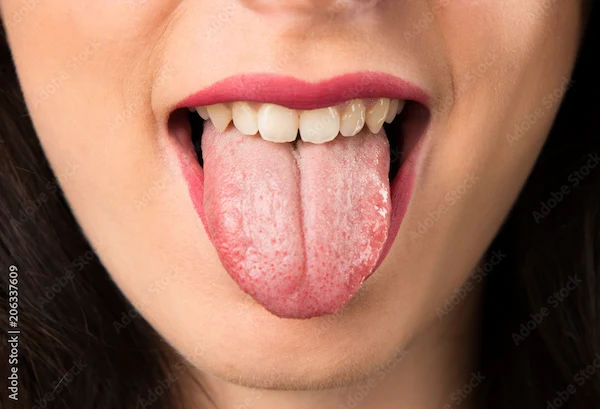White Mouth Patches: Causes, Symptoms, and When to Seek a Check-Up
Discover the causes, symptoms, and treatments for white mouth patches. Learn when to seek medical advice and how to maintain optimal oral health in this comprehensive guide.

Written by Dr.Sonia Bhatt
Last updated on 3rd Jul, 2025

White mouth patches can be a concerning sight, especially if you’re unsure what’s causing them. While they may not always indicate a serious condition, they should never be ignored. In this blog, we’ll explore everything you need to know about white mouth patches, including their causes, symptoms, and when to seek medical advice. By the end, you’ll have a clearer understanding of what these patches might mean and how to take care of your oral health.
What Are White Mouth Patches?
White mouth patches are areas of discolouration that appear on the soft tissues inside your mouth. They can develop on the tongue, gums, inner cheeks, roof of the mouth, or even the throat. These patches may look like small spots, streaks, or larger areas of white film. Sometimes, they can be raised, rough, or even painful to touch.
While some white patches are harmless and temporary, others may signal an underlying health issue that requires attention. Understanding the difference is key to maintaining good oral health.
Common Causes of White Mouth Patches
White mouth patches can arise from a variety of causes, ranging from minor irritations to more serious medical conditions. Here are some of the most common reasons:
1. Oral Thrush (Fungal Infection)
Oral thrush is caused by an overgrowth of the Candida fungus. It often appears as creamy white patches on the tongue, inner cheeks, or throat. Thrush is more common in people with weakened immune systems, those taking antibiotics, or individuals with diabetes.
2. Leukoplakia
Leukoplakia is a condition where thick, white patches form on the gums, tongue, or inner cheeks. It’s often linked to irritants like smoking, alcohol, or ill-fitting dentures. While most cases are benign, some leukoplakia patches can be precancerous.
3. Oral Lichen Planus
This is an autoimmune condition that causes white, lacy patches or sores in the mouth. It can be uncomfortable and may require treatment to manage symptoms.
4. Canker Sores or Mouth Ulcers
Small, painful ulcers with a white or yellowish centre can develop due to stress, injury, or certain foods. These usually heal on their own within a week or two.
5. Trauma or Irritation
Accidentally biting your cheek, brushing too hard, or wearing poorly fitted dental appliances can cause white patches to form as the tissue heals.
6. Other Causes
Less common causes include allergic reactions, vitamin deficiencies, or systemic conditions like lupus.
Symptoms Associated with White Mouth Patches
White mouth patches can come with a range of symptoms, depending on their cause. Here are some signs to watch out for:
Pain or Discomfort: Some patches may feel sore, especially when eating or drinking.
Burning Sensation: A feeling of burning or irritation in the affected area.
Dry Mouth: Reduced saliva production can sometimes accompany white patches.
Bleeding or Swelling: In severe cases, the patches may bleed or become inflamed.
Altered Taste: Some people notice a metallic or bitter taste in their mouth.
Systemic Symptoms: Fever, fatigue, or weight loss may occur if the patches are linked to an underlying condition.
When to See a Doctor
While some white mouth patches are harmless and resolve on their own, others require medical attention. Here are some signs that you should see a doctor or dentist:
The patches last longer than two weeks.
They are painful, bleeding, or growing in size.
You have difficulty eating, swallowing, or speaking.
You experience unexplained weight loss or fatigue.
You have a history of smoking, alcohol use, or other risk factors for oral cancer.
Early diagnosis is crucial, especially if the patches are linked to a serious condition like oral cancer.
Diagnostic Process for White Mouth Patches
If you visit a doctor or dentist for white mouth patches, they will likely follow these steps to determine the cause:
Physical Examination: The doctor will examine your mouth, throat, and neck for signs of infection, irritation, or abnormal growths.
Medical History Review: They’ll ask about your lifestyle, diet, smoking or alcohol use, and any recent illnesses or medications.
Biopsy or Scraping: If the patches look suspicious, a small sample may be taken for lab analysis.
Imaging Tests: In rare cases, imaging like X-rays or MRIs may be needed to rule out deeper issues.
This process helps ensure an accurate diagnosis and appropriate treatment.
Consult Top Otolaryngologist
Treatment Options for White Mouth Patches
Treatment depends on the underlying cause of the white patches. Here are some common approaches:
Oral Thrush: Treated with antifungal medications like nystatin or fluconazole.
Leukoplakia: Managed by removing irritants (e.g., quitting smoking) and, in some cases, surgical removal of patches.
Lichen Planus: Treated with steroid creams, mouth rinses, or immunosuppressive drugs.
Canker Sores: Heal on their own, but numbing gels or mouthwashes can ease discomfort.
Trauma or Irritation: Resolves once the source of irritation is removed.
In all cases, maintaining good oral hygiene is essential for recovery.
Prevention Tips
Preventing white mouth patches often comes down to good oral hygiene and healthy lifestyle choices. Here are some tips:
Brush your teeth twice a day and floss regularly.
Avoid tobacco products and limit alcohol consumption.
Visit your dentist for regular check-upss and cleanings.
Manage underlying health conditions like diabetes or autoimmune disorders.
Stay hydrated to prevent dry mouth.
Potential Complications of Untreated White Mouth Patches
Ignoring white mouth patches can lead to complications, especially if they’re linked to a serious condition.Early intervention is key to avoiding these risks. For example:
Oral Cancer: Untreated leukoplakia can progress to cancer in some cases.
Infection: Fungal or bacterial infections can spread if left untreated.
Chronic Pain: Persistent patches can cause ongoing discomfort and affect your quality of life.
Lifestyle Changes to Support Oral Health
Maintaining a healthy lifestyle can significantly reduce the risk of developing white mouth patches and other oral health issues. Here are some practical tips:
Quit Smoking: Tobacco use is a major risk factor for leukoplakia and oral cancer. Seek support to quit smoking if needed.
Limit Alcohol: Excessive alcohol consumption can irritate the mouth lining and increase the risk of oral health problems.
Eat a Balanced Diet: Include plenty of fruits, vegetables, and whole grains to boost your immune system and promote oral health.
Stay Hydrated: Drinking water helps keep your mouth moist and reduces the risk of dry mouth, which can contribute to white patches.
Manage Stress: Stress can weaken your immune system and trigger conditions like canker sores. Practice relaxation techniques such as yoga or meditation.
Conclusion
White mouth patches can be unsettling, but they’re often treatable with the right care. Whether they’re caused by a minor irritation or a more serious condition, early diagnosis and treatment are essential. If you notice persistent or painful patches in your mouth, don’t hesitate to seek medical advice. By taking care of your oral health and addressing issues promptly, you can keep your smile healthy and bright. Regular check-ups and a proactive approach to oral care can make all the difference. Stay informed, stay healthy, and don’t ignore the signs your body is giving you.
Consult Top Otolaryngologist
Consult Top Otolaryngologist

Dr. Ankit Khandelwal
Oral and Maxillofacial Surgeon
13 Years • BDS, MDS ( Oral & Maxillofacial Surgery) , PGDCC, Fellowship in Head & Neck Oncology
Kolkata
Gajanan Multispeciality Clinic, Kolkata
(75+ Patients)

Dr. Gourab Paul
Oral and Maxillofacial Surgeon
5 Years • BDS,MDS(ORAL AND MAXILLOFACIAL SURGERY)
Kolkata
SOLACE OF SOULS(SOS) HEALTH CARE, Kolkata
(25+ Patients)

Dr. Swastik Satpathy
Dentist
10 Years • BDS
Bhubaneswar
INNOVATIVE SMILE, Bhubaneswar

Dr. Himadri Sinha
Dentist
6 Years • BDS, FMC
New Town
AESTHETICAROOTS, New Town

Dr. Anuradha V
Dentist
30 Years • BDS, MDS (Oral & Maxillo Facial Surgery )
Bengaluru
Comprehensive Dental & Implant Centre, Bengaluru
Consult Top Otolaryngologist

Dr. Ankit Khandelwal
Oral and Maxillofacial Surgeon
13 Years • BDS, MDS ( Oral & Maxillofacial Surgery) , PGDCC, Fellowship in Head & Neck Oncology
Kolkata
Gajanan Multispeciality Clinic, Kolkata
(75+ Patients)

Dr. Gourab Paul
Oral and Maxillofacial Surgeon
5 Years • BDS,MDS(ORAL AND MAXILLOFACIAL SURGERY)
Kolkata
SOLACE OF SOULS(SOS) HEALTH CARE, Kolkata
(25+ Patients)

Dr. Swastik Satpathy
Dentist
10 Years • BDS
Bhubaneswar
INNOVATIVE SMILE, Bhubaneswar

Dr. Himadri Sinha
Dentist
6 Years • BDS, FMC
New Town
AESTHETICAROOTS, New Town

Dr. Anuradha V
Dentist
30 Years • BDS, MDS (Oral & Maxillo Facial Surgery )
Bengaluru
Comprehensive Dental & Implant Centre, Bengaluru

